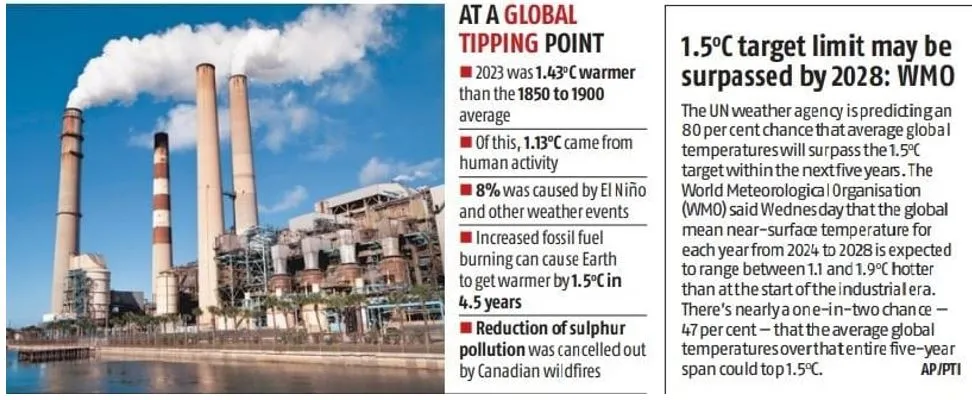

6th June 2024 (12 Topics)
Context
The recent report by the European Union's climate change monitoring service indicates a worrying trend: each of the past 12 months has been the warmest on record. This sustained rise in temperatures, culminating in a 12-month average of 1.63 degrees Celsius above pre-industrial levels, calls for urgent action to avert “climate hell”.
What is climate change?
- Climate change is not just a natural science problem. It is a social, economic, geopolitical, and national security problem, besides being an ethical and justice issue.
- Over the last decade, the world was on average around 1.2C warmer than during the late 19th Century.
- It has now been confirmed that global warming exceeded 1.5C across the 12 month period between February 2023 and January 2024. That followed 2023 being declared the warmest year on record.
- The temperature increase was driven by human-caused climate change and boosted by the natural El Niño weather phenomenon.
- Effects of climate change
- more frequent and intense extreme weather, such as heatwaves and heavy rainfall
- rapid melting of glaciersand ice sheets, contributing to sea-level rise
- huge declines in Arctic sea-ice
- Economic crisis, Affected global health, Migration
- Rising Temperatures, Shifting Rainfall Patterns, Thawing Permafrost
- Impact on Ecosystems (disrupting biodiversity and ecological balance)
- Human Health Impacts
- Ocean Acidification (endangering marine life and ecosystems)
- Food System Disruption
- Threat to Animals (habitat loss, altered migration patterns, and changing ecosystems)
Imminent Risk of Exceeding Critical Threshold:
- The UN's World Meteorological Organization (WMO) warns that there's an 80% chance of surpassing the critical 1.5-degree mark within the next five years.
- 12-month heat streak: Every single month from June 2023 to May 2024 was the world's hottest such month on record.
- In India, dozens have dies over the past few weeks as temperatures pushed towards 50 degrees Celsius.
- Hotter air and oceans also fuel heavier rainfall and destructive storms like those that have battered the United States, Brazil, Kenya and the United Arab Emirates, among other nations, this year.
- Call for Drastic Reduction in Fossil Fuel Usage: To address this urgent situation, there is a pressing need for a significant reduction in global fossil fuel production and usage by 2030. The call for a 30% cut underscores the severity of the situation and the necessity for decisive action to curb greenhouse gas emissions.
- Urgent Need to Mitigate Economic and Environmental Costs: The repercussions of failing to address climate change are dire. Urgent action is needed to mitigate the economic costs, environmental damage, and increased vulnerability to extreme weather events that result from rising global temperatures.

Challenges:
- The world is “decades behind” in the transition to clean energy.
- Discrepancy Between Commitments and Actions: Despite global agreements and efforts to curb carbon dioxide emissions, the reality paints a different picture. Carbon emissions from fossil fuels reached a record high last year, indicating a significant gap between commitments and actions in the fight against climate change.
- Temporary Respite vs. Long-term Trend: While temporary cooling effects like La Nina may provide brief relief, they do not alter the overall upward trajectory of global temperatures. It's crucial to recognize these fluctuations as mere deviations from the long-term trend of escalating climate change.
- Projection of Worsening Conditions: Projections indicate that at least one of the next five years could surpass the record-breaking temperatures observed in 2023. This projection underscores the urgency of the situation and the need for immediate action to address climate change.
- Concerning Developments and Future Outlook: Scientists highlight alarming developments, such as the rapid loss of Antarctic sea ice, which further exacerbates the climate crisis. It's imperative to acknowledge these developments and take decisive action to reverse the trend of rising global temperatures.
India’s Measures to combat climate change
India's Role in International Climate Diplomacy:
|


